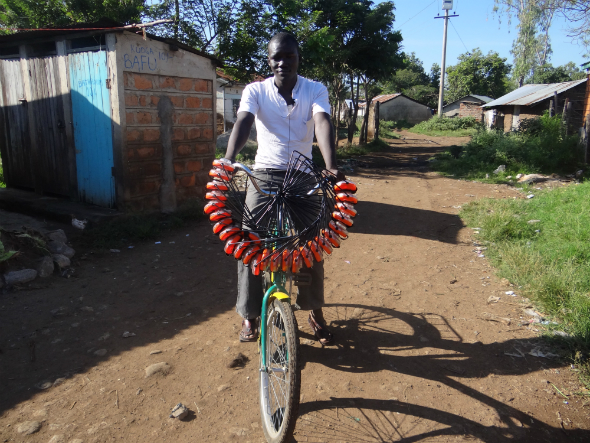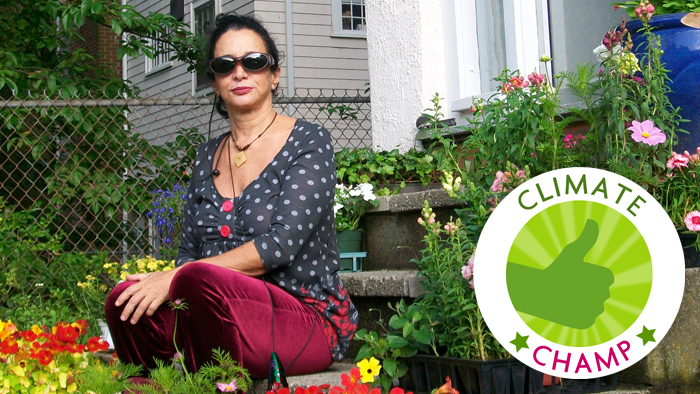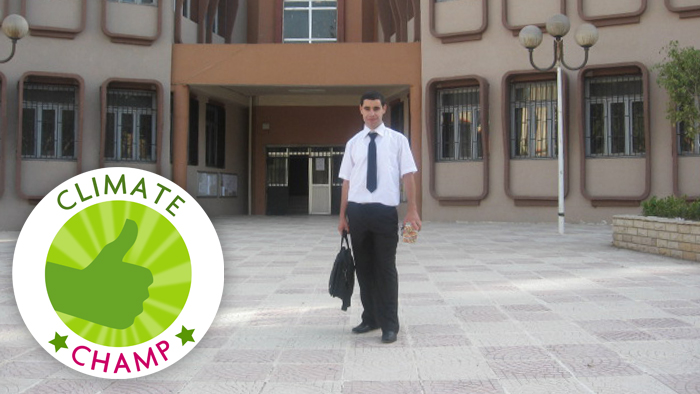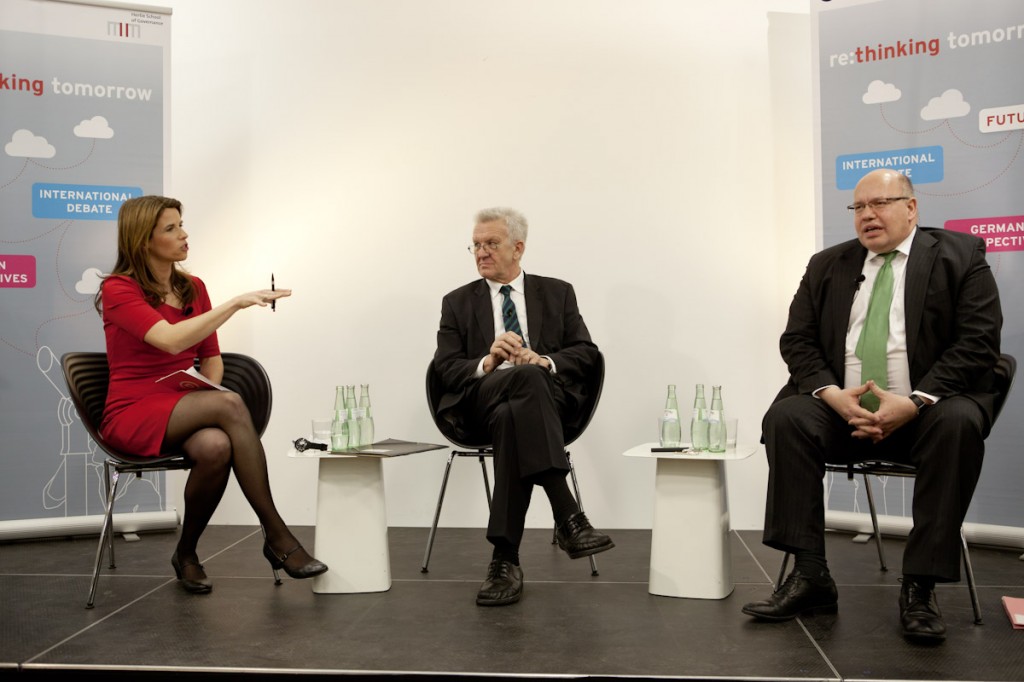Renting or buying – A difficult decision!

“Take a gap year and save the planet!” This could be the motto of the Kenyan based organisation “Ecofinder”. Founded in 1995 the Kenyan grass roots organisation helps communities around Lake Victoria to lead a more sustainable life. GLOBAL IDEAS has invited Nicolas, one of Ecofinder’s numerous volunteers, to write about his experience:
As a volunteer one of my main tasks is the so called “green energy promotion”. Here I try to drive the distribution of solar lamps forward. In this field we are running two different projects. The first one is called “Right Light”, it gives users of sooty kerosene lanterns the opportunity to rent a solar lamp over night for a very low price. So they don’t need to buy more expensive, health and environment damaging kerosen. The second project we call “Villageboom.” Here we encourage people to buy solar lamps as an investment in their future.
The major difference both is obvious, a person is either the owner of a solar lamp or the person rents the lamp. Both have advantages and disadvantages. For example: Almost everybody can afford the rent of one solar lamp for one night (about 9 Euro Cent). Another positive aspect is that the person who rents does not bear a risk if the lamp fails and is broken. But by possessing a solar lamp users can save a lot more money, because the sun will charge their lamp for free every day. Unfortunetaly for most of the people without electricity a good solar lamp is still very expensive.
In the long run renting a lamp will be more expensive than buying one. After one year of renting a lamp the rent will equal the value of buying a lamp twice. In conclusion I think installment payments are the best solution for poorest who are looking for a clean and cheap light. Therefore it could be very interesting and succesful to combine both concepts. For example our Solar Lamp Entrepreneurs-SLE could offer to their customers to buy a solar lamp bit by bit and not at once.
I’ll keep you updated how our solar lamp distribution is going on in future. But if you have any idea, suggestion or proposal about this issue feel free to comment and to share your thoughts.
In your opinion: “What is the best way to enable as much people as possible a solar lamp?”
Climate Champ – Provide Environmental Education
 Do you feel responsible for our future? Are you tired of waiting for a breakthrough at climate conferences? If you are already taking action yourself, you are our ClimateChamp and we want to get to know you! Answer our questionnaire to become a part of our new blog series, take your chance to be nominated as a Climate Champ.
Do you feel responsible for our future? Are you tired of waiting for a breakthrough at climate conferences? If you are already taking action yourself, you are our ClimateChamp and we want to get to know you! Answer our questionnaire to become a part of our new blog series, take your chance to be nominated as a Climate Champ.
1. What is your name? How old are you? Where do you live? What is your job?
My name is Kátia Martins de Almeida. I am 61 years old and I live in Rio de Janeiro, Brazil. I am a clinical Psychologist and I used to live in Boston, MA. Here I was working with streets kids and as a Psychologist in public schools. In 2003 when I came back to Brazil to take care of my mother, I bought land in Cruzeiro. Now I am retired and I live in a two-room-apartment in front of the Sugar Loaf.
2. How does the climate change affect your everyday life in your community?
The community life in the village Cruzeiro had totally changed in the last 5 years. More clearly, on the 12th of January 2011 a huge amount of water came from the sky, with lightening I have never seen before. The massive rain broke 50 tons of rocks of from our granite mountains which rolled over the houses of the village. The river raised 3 meters in 3 minutes. In these 3 minutes we lost the only bridge that we had and 20 houses were destroyed. Furthermore, and even more tragic, 2 people died. Cruzeiro is a small agricultural village with 500 families. Most of the people around here are framers. The community is in total grief because of all their losses and sorrows about their identity: the land was completely mud and they had to move to somewhere else. After that thunderstorm the government did not help us. It is rumored that corrupted politicians had stolen money which the Federal Government gave to the City Hall of Teresópolis (another affected village where more than 1000 people died). Fact is the government did not build a new bridge in our village Cruzeiro, neither they helped us to rebuild the destroyed houses.
3. What trigger event led you to start fighting climate change?
2003 when I bought my land, the Neighborhood Association of Cruzeiro found a water source inside it. With 70 volunteers, they built a pipe leading to the village, where the Association has a water wheel and shares the water for a fee of 6 Real (about 2 Euro). Among others, the collected money is for the bakery, the butcher, the shoemaker and for the 20 family-houses, which disappeared under the water on January 12th 2011.
4. How exactly do you fight climate change?
I founded a non-profit organization in order to make it easier to help my community. In 2009 I was trying to start a project to transform my 400.00 m2 land of natural jungle (in Cruzeiro, Brazil) into a World Natural Reservation.
5. What do you say to climate change deniers?
Denial is a mental disease and must be treated like that. Or they are cynical. I would like to invite them to come to some beaches here in Brazil that are disappearing and also to come to visit the families of the Rio de Janeiro’s agricultural belt. We are the salad garden of Rio de Janeiro! If we loose our plantations, Rio will have trouble eating green leaves and fruits.
6. Worst case scenario: What do you think your city looks like 10 years from now, if no action had been taken to fight climate change?
It will disappear because without hope for good future the youth is leaving. There is some kind of “Youth Exodus” in all agricultural villages.
7. Best case scenario: What do you think your city looks like 10 years from now, if more and more action had been taken to fight climate change?
If we provide environmental education to the people who live around the river Rio Paquequer, we can avoid a lot of problems about trash and diseases.
8. Short and simple: What do you demand from your government as far as climate change is concerned?
Stop killing Amazon, first of all! The government must introduce environmental education in the curriculum of all Brazilian schools. The government has to give us sewers or pipes for ourselves to build our sewers and also they have to give us trash bags to pick up heavy trash. Another point is to talk with the farmers to avoid some bad ecological habits.
9. How can interested people take part in your project?
Asking them to come to visit Rio de Janeiro and its rural farms and see the reality that the Media does not show about Rio.
Climate Champ – Act now or never!
 Do you feel responsible for our future? Are you tired of waiting for a breakthrough at climate conferences? If you are already taking action yourself, you are our ClimateChamp and we want to get to know you! Answer our questionnaire to become a part of our new blog series, take your chance to be nominated as a Climate Champ.
Do you feel responsible for our future? Are you tired of waiting for a breakthrough at climate conferences? If you are already taking action yourself, you are our ClimateChamp and we want to get to know you! Answer our questionnaire to become a part of our new blog series, take your chance to be nominated as a Climate Champ.
What is your name? How old are you? And where do you live?
My name is Kaddouche Mourad, born on the 23rd of October 1986 in Algeria. Right now I live in Tizi Ouzou (Kabylia) and I study at the University of Béjaïa.
How does climate change affect your everyday life / your community?
Droughts are harmful for agriculture and that threatens our food security. A lot of water is needed to irrigate fields, and that takes away from the supply of drinking water!
What trigger event led you to start fighting climate change?
The trigger event was snow that measured four feet (1.2192 meters) high here in Algeria. That happened twice in Algeria, in 2005 and 2012. Both times it lasted more than 15 days. There were many problems for people especially in getting food and health care because neither the local authorities nor the government were able to solve the problems. On the other hand in the summer, temperatures rise to more than 45 degrees Celsius (113 degrees Fahrenheit) – that sometimes leads to forest fires.
How exactly do you fight climate change?
As a doctoral candidate in biology – to be precise in biology, health and environment – I hope that my thesis will help to solve some questions. My thesis is about olive tree fields as an agro-ecosystem. The topic corresponds to sustainable development because the olive tree ecosystem includes social, economic and ecological values in Kabylia. The olive tree agro-ecosystem helps people to earn more money without using fertilizers, pesticides or herbicides. Some of these ecosystems are still wild and here biodiversity is preserved. I study the different disruptions that occur by monitoring it with GIS (geographic information systems) and by mapping . With the results, I try to get a better understanding of the reality to take practical decisions to help both local inhabitants and decisionmakers improve food safety and the environment. The topic is still in development so of course many points still need to be discussed.
What do you say to climate change skeptics?
Harmful effects are on the way if we don’t act now!
Worst case scenario: What do you think your city will look like 10 years from now if no action is taken to fight climate change?
We will see more smog and fewer green spaces.
Best case scenario: What do you think your city will look like 10 years from now if further action is taken to fight climate change?
There will be fresh air, clear water and still green areas.
Short and simple: What do you demand from your government as far as climate change is concerned?
Act now or never!
Germany’s energy transition “biggest challenge since World War II”

How much should Germany’s “Energiewende,” a move towards ramping up renewable energy, cost? That question was the main sticking point at a lively debate on Wednesday between German Environment Minister Peter Altmaier (a member of the governing Christian Democratic Party) and the Green Party’s first state premier in Baden-Württemberg, Winfried Kretschmann. The discussion at the Hertie School of Governance was part of an ongoing series of events called “Re:Thinking Tomorrow.” The events are co-organized by Deutsche Welle, which is also a media partner.
The energy transition which involves phasing out nuclear and fossil fuels has sparked huge international interest and remains a hot-button issue in the country. In an interview with Global Ideas, Environment Minister Peter Altmaier said the transformation of Germany’s energy system “is the biggest challenge since the Second World War.” “It means a complete transformation of the backbone of Germany’s economy and business,” he added.
Altmaier went on to speak about the technical and financial challenges in scaling up renewables and phasing out nuclear energy as well as how Germany can build on its reputation as a pioneering power in green issues.
All about the German energy turnaround (Energiewende) – statement Peter Altmaier @ Hertie School from DW_Global Ideas on Vimeo.
Both Altmaier and Kretschmann are considered political heavyweights when it comes to climate and environmental issues, which made for some amusing and lively verbal exchanges. Kretschmann began by accusing Altmaier of unsettling voters. “People already mix up millions and billions,” he said, adding “and now you are talking about trillions!” That elicited quite a few laughs from the audience. A few weeks ago, Altmaier had said Germany’s energy transition would cost energy consumers up to one trillion Euros if certain measures weren’t taken such as putting brakes on electricity prices.
Both participants agreed that Germany’s energy transition has to be an ecological and economic success if it is to find wide acceptance both within Germany and beyond. Germany may only be responsible for three percent of the world’s CO2 emissions, they argued. But if it managed to successfully pull off its ambitious energy transition project and move towards a low-carbon economy, it could offer vital lessons for big polluters such as China. That’s why, they stressed, it remains important not to jeopardize the energy project.
Kretschmann said the energy transition had already led to green growth with jobs and opportunities generated in the renewables sector. To keep things this way, Environment Minister Altmaier said brakes had to be put on electricity prices. The turnaround has to stay affordable for everyone, he added.
Kretschmann underlined the positive effects of the energy turnaround in the future. In the long run, consumers will pay less for electricity, Kretschmann argued, saying “the sun, after all, doesn’t send you any bills.”
Students discuss the German “Energiewende” 5/5
Today, international students from the Hertie School in Berlin will be participating in a discussion forum with German Environment Minister Peter Altmaier and Winfried Kretschmann, the Green Party’s first state premier in Baden-Württemberg. The debate will focus on Germany’s “Energiewende,” literally an energy turnaround involving ambitious plans to phase out nuclear power and boost renewable energy.
Also today, we’ll be introducing the students taking part in the debate. Karina Campos from Argentina is our last candidate.
Karina Campos, Argentina from DW_Global Ideas on Vimeo.








Feedback